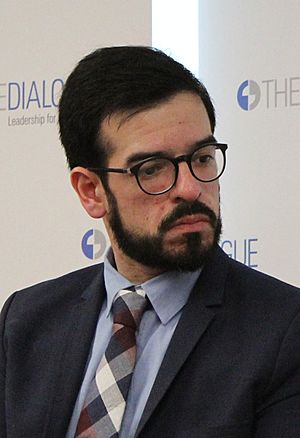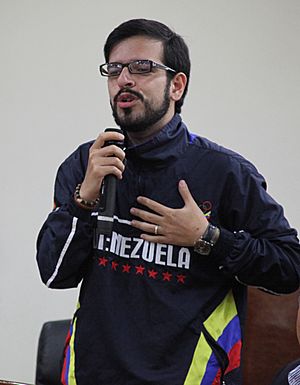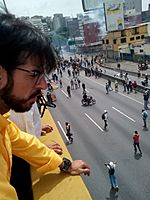Miguel Pizarro facts for kids
Quick facts for kids
Miguel Pizarro
|
|
|---|---|

Pizarro in 2020
|
|
| Deputy of the National Assembly for Miranda |
|
| Assumed office 5 January 2011 |
|
| President of the Commission for Social Development and Integration | |
| In office 13 January 2016 – 18 January 2017 |
|
| Preceded by | Oswaldo Vera |
| Succeeded by | Juan Requesens |
| Personal details | |
| Born |
Miguel Alejandro Pizarro Rodríguez
February 17, 1988 Petare, Miranda, Venezuela |
| Political party | Justice First Progressive Advance (formerly) |
| Residence | Sucre Municipality, Miranda |
| Education | Universidad Central de Venezuela |
Miguel Alejandro Pizarro Rodríguez, born on February 17, 1988, is a politician from Venezuela. He is a member of the country's main law-making body, the National Assembly. He represents the area of Petare in Caracas.
Contents
Early Life and Political Beginnings
Miguel Pizarro's family moved to the state of Táchira when he was born. He lived there until he was four years old. After that, they moved back to the "barrio 24 de Julio" neighborhood. Miguel spent most of his childhood there. When he was a student, he was part of a punk band called Kolumpio.
Family Background in Activism
Miguel Pizarro started getting involved in politics at age 13. His family had a history of political activism.
- His father was a left-wing political activist in the 1970s. He also worked to support trade unions and was once held in prison.
- His mother helped start a group that defended the human rights of political prisoners. She also worked for a group of left-wing parties in the Senate.
Early Activism and Student Protests
When he was young, Pizarro was interested in anarchism. He liked the ideas of thinkers like Mikhail Bakunin and Peter Kropotkin. These ideas were similar to the "anarco-punk" music style.
In high school, he started an anti-military group called "Ni casco ni uniforme" (which means "Without helmet or uniform"). This group was against the government's plan to teach military education in high schools. Because of his protests, he was expelled from the Franciscan school he attended.
The 2007 Student Movement
In 2007, Miguel Pizarro became a student leader at the Central University of Venezuela. He helped start and took part in the protests of the Student Movement. Other future politicians, like Freddy Guevara and Juan Guaidó, were also part of this movement.
The students were protesting the closing of a TV channel called RCTV. Pizarro also actively worked against a plan by then-President Hugo Chávez to change the country's constitution in 2007.
Serving in the National Assembly
Miguel Pizarro was first elected as a deputy (a representative) to the National Assembly in the 2010 Venezuelan parliamentary election. He was only 21 years old at the time. He was supported by a group of parties called the Democratic Unity Roundtable (MUD). He represented the second district of Táchira.
In 2015, he worked on a special law to stop violence at sports events. This law was created after a fan was shot and killed during a football match in November 2014.
Speaking Out in the Assembly
Pizarro has often said that the National Assembly was not doing enough to solve Venezuela's problems. He believed they should focus on helping people instead of just arguing about politics.
He once said in the Assembly:
"Our National Assembly cannot ignore what is happening on the streets. [...] You can stand here and say we are victims of an economic war. What we are victims of is a government that doesn't work and doesn't let things get done."
—Miguel Pizarro, National Assembly, August 11, 2015.
Pizarro is a member of the Commission for Social Development. Here, he helped create important laws:
- The Organic Law on Sports: This was the first law passed with agreement from many groups, including the Venezuelan Olympic Committee.
- The Law for the Promotion and Protection of the Right to Equality: This law helps people with HIV/AIDS and their families.
Reelection as a Deputy
On June 24, 2015, the MUD announced its candidates for the 2015 Venezuelan parliamentary election. On December 6, Miguel Pizarro was reelected. He won with 64.9% of the votes in the third district of Miranda state, which includes Petare. Some of his campaign team had been attacked by groups called colectivos before the election.
Leading the Social Development Commission
During 2016, Pizarro was the president of the National Assembly's Commission for Social Development. He helped promote several laws, including:
- The Law of Bond for Food and Medicines for Pensioners and the Retired.
- The Law of Guarantee of School Meals.
- The Law of Recognition and Protection for People with Autism Spectrum Disorders and Similar Conditions.
Human Rights Activism
Miguel Pizarro has worked for human rights for many years. He especially helped families of people who were detained during the protests that started in 2014. He worked with them to help them get fair trials. While he did not support violent protests, he spoke out against the government of Nicolás Maduro.
In 2014, a young lawyer and deputy named Robert Serra was murdered. Pizarro spoke openly in the National Assembly to demand respect during debates about this case. He also demanded that those responsible for the crime be brought to justice. He called for an end to all violence.
In November 2016, Venezuela received a report that criticized its human rights record. Pizarro took the lead in making sure that different commissions in the Assembly looked into these issues.
See also
 In Spanish: Miguel Pizarro Rodríguez para niños
In Spanish: Miguel Pizarro Rodríguez para niños
 | James Van Der Zee |
 | Alma Thomas |
 | Ellis Wilson |
 | Margaret Taylor-Burroughs |



